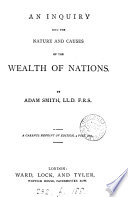 | Adam Smith - Economics - 1801 - 362 pages
...would by no means follow that they would there-; by be deprived either of employment or fub-. fiftence. By the reduction of the army and navy at the end of...late war, more than a hundred thoufand foldiers and teamen, a number equal to what is employed in the greateft manufactures , 'were all at once thrown... | |
 | Adam Smith - Economics - 1811 - 852 pages
...would by no means follow that they would 1V- thereby be deprived either of employment or fubfillence. By the reduction of the army and navy at the end of...feamen, a number equal to what is employed in the greatefl manufactures, were all at once thrown out of their ordinary employment ; but, though they... | |
 | Adam Smith - Economics - 1822 - 562 pages
...it would by no means follow that they would thereby be deprived either of employment or subsistence. By the reduction of the army and navy at the end of the late war, more than a hundred thousand soldiers and seamen, a number equal to what is employed in the greatest manufactures, were... | |
 | Adam Smith - 1836 - 538 pages
...it would by no means follow that they would thereby be deprived either of employment or subsistence. By the reduction of the army and navy at the end of the late war, more than a hundred thousand soldiers and seamen, a number equal to what is employed in the greatest manufactures, were... | |
 | James Taylor (of Bakewell.) - Economics - 1852 - 96 pages
...seven years' war with France, which terminated in 1763, he makes the following observation : — " By the reduction of the army and navy at the end " of the late war, more than 100,000 soldiers and sea" men — a number equal to what is employed in the " greatest manufactures,... | |
 | Adam Smith - 1875 - 808 pages
...it would by no means follow that they would thereby be deprived either of employment or subsistence. By the reduction of the army and navy at the end of the late war, more than a hundred thousand soldiers and seamen, a number equal to what is employed in the greatest manufactures, were... | |
 | H. W. Furber - Free trade - 1884 - 540 pages
...it would by no means follow that they would thereby be deprived either of employment or subsistence. By the reduction of the army and navy at the end of the late war, more than a hundred thousand soldiers and seamen, a number equal to what is employed in the greatest manufactures, were... | |
 | H. W. Furber - Free trade - 1884 - 554 pages
...it would by no means follow that they would thereby be deprived either of employment or subsistence. By the reduction of the army and navy at the end of the late war, more than a hundred thousand soldiers and seamen, a number equal to what is employed in the greatest manufactures, were... | |
 | Adam Smith - Economics - 1894 - 526 pages
...it would by no means follow that they would thereby be deprived either of employment or subsistence. By the reduction of the army and navy at the end of the late war, more than a hundred thousand soldiers and seamen, a number equal to what is employed in the greatest manufactures, were... | |
 | Charles Jesse Bullock - Finance - 1906 - 700 pages
...expenditure in no way increased the industry of the country or the employment given to labor. He says : 3 " By the reduction of the army and navy at the end of the late war, more than a hundred thousand soldiers and seamen, a number equal to what is employed in the greatest manufactures, were... | |
| |